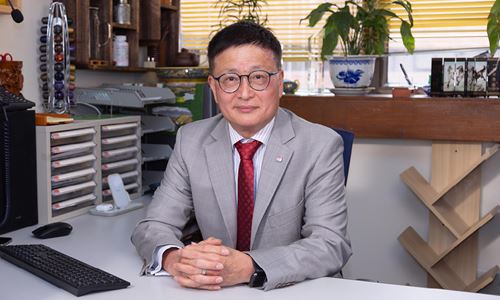His research has been supported by substantial government and industrial grants. He has directed a strong research team and collaborated closely with leading academic and industrial organisations in joint projects and start-up companies. He has published extensively and his works have been highly cited. He serves as an associate editor and editorial board member for several international journals and has chaired numerous international conferences in recent years.
Professor Huang is currently leading a major project funded under the Hong Kong Research Grants Council’s (RGC) Theme-based Research Scheme with the goal of innovating and developing the cyber-physical internet for synchronising cross-border logistics hubs in the Greater Bay Area. His vision is to achieve a future of sending and receiving goods in the same way as we now send and receive email messages. If realised and utilised, the way that logistics services are provided and consumed will change dramatically, just as email changed the role of post offices and the way people use postal services.

Professor Huang is also leading major RGC, Collaborative Research Fund and Research Impact Fund projects on cyber-physical computing with the aim of innovating and developing cyber-physical controllers that compute with digital twins and enable industrial digitisation and digitalisation in the same way that programmable logic controllers have enabled industrial automation. New models and algorithms will be developed for smart manufacturing and logistics operations planning, routing, scheduling and execution on a real-time basis.
Professor Huang has recently initiated two Innovation and Technology Fund projects in partnership with industrial collaborators to develop and apply manufacturing large models including generative artificial intelligence and generative pre-trained transformer. Although the current projects focus on specific shipbuilding and garment production applications, the insights and technologies will demonstrate how AI plays key roles in the transformation and upgrading of traditional manufacturing operations and practices more broadly.



 Professor Huang is also leading major RGC, Collaborative Research Fund and Research Impact Fund projects on cyber-physical computing with the aim of innovating and developing cyber-physical controllers that compute with digital twins and enable industrial digitisation and digitalisation in the same way that programmable logic controllers have enabled industrial automation. New models and algorithms will be developed for smart manufacturing and logistics operations planning, routing, scheduling and execution on a real-time basis.
Professor Huang is also leading major RGC, Collaborative Research Fund and Research Impact Fund projects on cyber-physical computing with the aim of innovating and developing cyber-physical controllers that compute with digital twins and enable industrial digitisation and digitalisation in the same way that programmable logic controllers have enabled industrial automation. New models and algorithms will be developed for smart manufacturing and logistics operations planning, routing, scheduling and execution on a real-time basis.